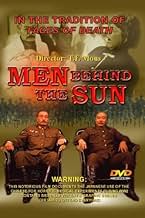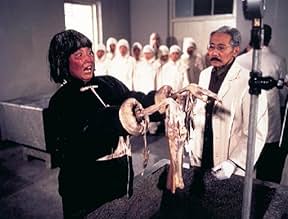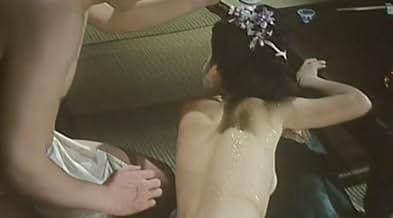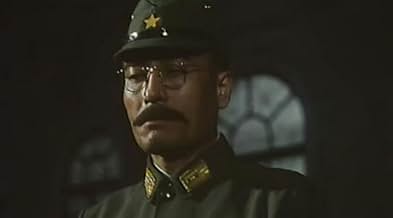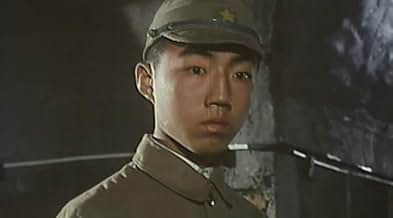AVALIAÇÃO DA IMDb
6,1/10
7,8 mil
SUA AVALIAÇÃO
As tropas japonesas prendem prisioneiros de guerra chineses e russos e os levam para a unidade 731, eles são terrivelmente torturados e experimentados para testar novas armas biológicas.As tropas japonesas prendem prisioneiros de guerra chineses e russos e os levam para a unidade 731, eles são terrivelmente torturados e experimentados para testar novas armas biológicas.As tropas japonesas prendem prisioneiros de guerra chineses e russos e os levam para a unidade 731, eles são terrivelmente torturados e experimentados para testar novas armas biológicas.
- Direção
- Roteiristas
- Artistas
Zhaohua Mei
- Takamura
- (as Zhao Hua Mei)
Runshen Wang
- Camp Lieutenant
- (as Run Shen Wang)
- Direção
- Roteiristas
- Elenco e equipe completos
- Produção, bilheteria e muito mais no IMDbPro
Avaliações em destaque
Please do not watch this movie only for its gory scenes. There aren ´t that many of them and you can see similar ones regularly on Reality TV and the likes. The film´s true driving force is strong acting, good script and the veil of foulness, for the story (and even the gore scenes) are based on true facts and documents. You will certainly be disturbed, but rather for the feeling that what you´re watching really happened. Definetly recommended. 7/10
Men Behind the Sun deals with the torture of Chinese POWs by their Japanese captors: Air Squadron 731, at the latter's snow-bound concentration camp.
I've seen a lot of extreme cinema in my time: not because I'm a "gorehound" or am constantly seeking the "ultimate nasty" but because I want a film to affect me. I'm very much of the "it's just a film" school and it therefore takes a well-made, strong film in order to allow me to suspend my disbelief.
I've seen most of the so-called "nasties", including Cannibal Holocaust and some of the Guinea Pig series. I didn't find the latter terribly effective and Cannibal holocaust is a gut-munching gore fest in its uncut form but Men Behind the Sun completely eclipses it for sheer brutality.
What makes Men Behind the Sun so effective for me is the relative realism. Zombie movies don't disturb me simply because zombies are fantasy. To a lesser extent, so are cannibals. Both genres have "yuck" moments and on first viewing, Cannibal Holocaust shocked me slightly with its relentless gore. Men Behind the Sun is somehow more calculated.
Why am I making comparisons with Cannibal Holocaust? The majority of film viewers will be familiar with the so-called "video nasties" and will probably have seen some of them. Cannibal Holocaust is generally considered to be the strongest of the video nasties but Men Behind the Sun is in a different league, in my opinion. Men Behind the Sun is to Cannibal Holocaust as Cannibal Holocaust is to say, The Exorcist.
What makes Men Behind the Sun so effective is its realism: humans, not zombies, cannibals or monsters. It deals with what atrocities humans are capable of committing upon their own kind.
Guinea Pig: The Devil's Experiment is a similar study but it has all characterisation and plot stripped away, leaving just the torture. Because of this, there are no characters to engage or empathise with. Certain scenes are very graphic but without context and therefore not affecting.
Men Behind the Sun has characters and plot and most of the film is just that: a film. The torture and experiment scenes are intense sequences set within what is otherwise a normal film. And there lies the film's effectiveness: because it builds characters, we are drawn in. Because the film deals with real life, we are able to suspend our disbelief and become immersed in it.
The torture and experiment scenes in Men Behind the Sun are intense for their unstinting focus and graphic depiction of cruelty. They are disturbing but compelling; like looking at a car crash when you know you shouldn't. The imagery is so graphic and realistic that the scenes stay with you, long after viewing the film.
*** Possible spoilers ***
Even before the gory torture and experiment scenes, we witness utter inhumanity near the beginning of the film, as a mother is robbed of her baby. A Japanese officer simply takes the baby from the mother and tosses it into the snow. As the mother weeps, the officer muffles the baby's cries by kicking snow over it.
Later in the film, we see the mother tied to a wooden structure in the freezing outdoors. An officer approaches her, treading on her baby's body as he does so. Her already frost-bitten arms are doused in cold water several times, before she's taken inside. There, her arms are dipped in a solution of some kind and I shan't describe what follows. To do so would deny any potential viewer one of the biggest shocks of the film. Be prepared.
Continuing the frostbite theme, we see a Chinese man forced to place his arms into a dry ice container. They emerge frozen solid and are then hacked off by a Japanese soldier, breaking like china.
The infamous decompression chamber sequence is where the director is alleged to have used a real cadaver. I can't confirm or deny that but the scene is another shocking one: a Chinese man is placed inside the chamber and the pressure gradually reduced. Eventually, the pressure is so little that the man's colon falls out of his anus.
Another notorious scene is the live autopsy: a deaf, mute Chinese boy, whom the viewer grows to like, is tricked into lying on an operating trolley. There he is anaesthetised with ether before being dissected. Rumours abound that this scene also used a real cadaver but personally I doubt that. I am convinced from the camera cuts that this sequence is just very good special effects. Once done with the boy, the Japanese simply throw his crumpled body into a trailer before he's taken away for incineration: completely inhuman and affecting.
The sequence involving the cat is the one probably most often thought to be real. I can't be absolutely sure but I don't believe this to be the case. Rather, I believe that the cat could have been drugged and certainly think the blood to be fake. In any case, the cat being eaten alive by rats is a very disturbing scene.
*** End of spoilers ***
Overall, this is a strong piece of film-making, in every sense. The story is a worthy one and the unpleasant imagery serves to drive home the message that the film carries. These are not images that are easily erased from one's mind. This film certainly affected me.
I would recommend this film as advised viewing. I wouldn't say to anyone, "If you want to see something really nasty...", or "You have to see this film because it's really gory." Rather, I would advise watching it, with caution and preparedness for what lies within, as a good, powerful film.
This film will stay with me for a long time: savage, powerful and unforgettable
I've seen a lot of extreme cinema in my time: not because I'm a "gorehound" or am constantly seeking the "ultimate nasty" but because I want a film to affect me. I'm very much of the "it's just a film" school and it therefore takes a well-made, strong film in order to allow me to suspend my disbelief.
I've seen most of the so-called "nasties", including Cannibal Holocaust and some of the Guinea Pig series. I didn't find the latter terribly effective and Cannibal holocaust is a gut-munching gore fest in its uncut form but Men Behind the Sun completely eclipses it for sheer brutality.
What makes Men Behind the Sun so effective for me is the relative realism. Zombie movies don't disturb me simply because zombies are fantasy. To a lesser extent, so are cannibals. Both genres have "yuck" moments and on first viewing, Cannibal Holocaust shocked me slightly with its relentless gore. Men Behind the Sun is somehow more calculated.
Why am I making comparisons with Cannibal Holocaust? The majority of film viewers will be familiar with the so-called "video nasties" and will probably have seen some of them. Cannibal Holocaust is generally considered to be the strongest of the video nasties but Men Behind the Sun is in a different league, in my opinion. Men Behind the Sun is to Cannibal Holocaust as Cannibal Holocaust is to say, The Exorcist.
What makes Men Behind the Sun so effective is its realism: humans, not zombies, cannibals or monsters. It deals with what atrocities humans are capable of committing upon their own kind.
Guinea Pig: The Devil's Experiment is a similar study but it has all characterisation and plot stripped away, leaving just the torture. Because of this, there are no characters to engage or empathise with. Certain scenes are very graphic but without context and therefore not affecting.
Men Behind the Sun has characters and plot and most of the film is just that: a film. The torture and experiment scenes are intense sequences set within what is otherwise a normal film. And there lies the film's effectiveness: because it builds characters, we are drawn in. Because the film deals with real life, we are able to suspend our disbelief and become immersed in it.
The torture and experiment scenes in Men Behind the Sun are intense for their unstinting focus and graphic depiction of cruelty. They are disturbing but compelling; like looking at a car crash when you know you shouldn't. The imagery is so graphic and realistic that the scenes stay with you, long after viewing the film.
*** Possible spoilers ***
Even before the gory torture and experiment scenes, we witness utter inhumanity near the beginning of the film, as a mother is robbed of her baby. A Japanese officer simply takes the baby from the mother and tosses it into the snow. As the mother weeps, the officer muffles the baby's cries by kicking snow over it.
Later in the film, we see the mother tied to a wooden structure in the freezing outdoors. An officer approaches her, treading on her baby's body as he does so. Her already frost-bitten arms are doused in cold water several times, before she's taken inside. There, her arms are dipped in a solution of some kind and I shan't describe what follows. To do so would deny any potential viewer one of the biggest shocks of the film. Be prepared.
Continuing the frostbite theme, we see a Chinese man forced to place his arms into a dry ice container. They emerge frozen solid and are then hacked off by a Japanese soldier, breaking like china.
The infamous decompression chamber sequence is where the director is alleged to have used a real cadaver. I can't confirm or deny that but the scene is another shocking one: a Chinese man is placed inside the chamber and the pressure gradually reduced. Eventually, the pressure is so little that the man's colon falls out of his anus.
Another notorious scene is the live autopsy: a deaf, mute Chinese boy, whom the viewer grows to like, is tricked into lying on an operating trolley. There he is anaesthetised with ether before being dissected. Rumours abound that this scene also used a real cadaver but personally I doubt that. I am convinced from the camera cuts that this sequence is just very good special effects. Once done with the boy, the Japanese simply throw his crumpled body into a trailer before he's taken away for incineration: completely inhuman and affecting.
The sequence involving the cat is the one probably most often thought to be real. I can't be absolutely sure but I don't believe this to be the case. Rather, I believe that the cat could have been drugged and certainly think the blood to be fake. In any case, the cat being eaten alive by rats is a very disturbing scene.
*** End of spoilers ***
Overall, this is a strong piece of film-making, in every sense. The story is a worthy one and the unpleasant imagery serves to drive home the message that the film carries. These are not images that are easily erased from one's mind. This film certainly affected me.
I would recommend this film as advised viewing. I wouldn't say to anyone, "If you want to see something really nasty...", or "You have to see this film because it's really gory." Rather, I would advise watching it, with caution and preparedness for what lies within, as a good, powerful film.
This film will stay with me for a long time: savage, powerful and unforgettable
This is one of THE most disturbing movies I've seen. The thing that disturbed me the most was that it was based on the events of Squadron 731. The human testing in the movie was well done and pretty realistic. Some scenes were campy, while others made you wanna get up and vomit. The most disgusting to me was the cat thrown in a room of thousands of hungry rats. The rats tore the cat apart, and it was with real a real cat and real rats! No effects! Nonetheless, it was a good movie with a good story. Definitely don't plan to watch this movie with the family (or the cat) after Sunday dinner.
Man Behind the Sun is a worthy film, and readily smeared through its association with a number of schlock "sequels".
Given that most reviewers here can't read Chinese and are measuring the film by its disgust factor, it's easy to see why "Godfrey Ho" is wrongly credited with directing it, instead of just "parts" 2 and 3. The actual director, Mou Tun-fei (aka T.F. Mous) is alive and well and living in Taiwan at last report. He is also a committed Chinese nationalist, which helps to explain the genuine, almost uncontrollable anger in this film.
The "sequels" on the other hand are money-spinners. Anyone who has seen the original should know there was no scope for a sequel set in a camp that had already been destroyed at the conclusion of WWII. At best, "part" 2 is a remake, and a cheap, shabby one at that.
The film is also careful to note significant historical elements, such as how the US government protected some of the criminals portrayed in this film, partly in order to get hold of the scientific data produced at the expense of the lives of thousands of Chinese civilians. If you read books on the matter you will also discover that the vast majority of Japanese scientists implicated in these experiments went on to enjoy successful careers in Japanese universities.
There was no Simon Wiesenthal to chase up and prosecute these individuals, despite their conspicuous presence under a lengthy US administration, and to this day the two governments prefer not to talk about this particularly vile component of Japan's wartime legacy. "Stuff happens," eh Mr Rumsfeld?
Given that most reviewers here can't read Chinese and are measuring the film by its disgust factor, it's easy to see why "Godfrey Ho" is wrongly credited with directing it, instead of just "parts" 2 and 3. The actual director, Mou Tun-fei (aka T.F. Mous) is alive and well and living in Taiwan at last report. He is also a committed Chinese nationalist, which helps to explain the genuine, almost uncontrollable anger in this film.
The "sequels" on the other hand are money-spinners. Anyone who has seen the original should know there was no scope for a sequel set in a camp that had already been destroyed at the conclusion of WWII. At best, "part" 2 is a remake, and a cheap, shabby one at that.
The film is also careful to note significant historical elements, such as how the US government protected some of the criminals portrayed in this film, partly in order to get hold of the scientific data produced at the expense of the lives of thousands of Chinese civilians. If you read books on the matter you will also discover that the vast majority of Japanese scientists implicated in these experiments went on to enjoy successful careers in Japanese universities.
There was no Simon Wiesenthal to chase up and prosecute these individuals, despite their conspicuous presence under a lengthy US administration, and to this day the two governments prefer not to talk about this particularly vile component of Japan's wartime legacy. "Stuff happens," eh Mr Rumsfeld?
Going into Men Behind the Sun I knew that it was a serious movie that contained animal cruelty and just some seriously graphic material. And the rumors were true. It contained both. But I wasn't expecting a seriously well-made movie.
Men Behind the Sun centers around Squadron 731 and how it tortured and killed thousands and thousands of people so Japan would have a great chance at winning the war with Russia. Really the movie is almost entirely about how Squadron 731 can improve their chance to win the war. Be it through torture type situations like extreme temperature or through air-borne bacteria. It's been said that while Squadron 731 was up and running, it's said that there wasn't a single survivor. It's not just an hour and forty-five minutes of death and torture, even though it is close. The movie follows a large cast, whether they show the Generals and troops talking about how important this is to Japan or they show the victims and how they need to tell the world what is happening. It's an incredibly strong look at some of the darkest days this world has ever seen. Many a country have committed awful acts, and I suppose this is Japan's. Even though I hear Japan hasn't officially said it took place.
Like I said before, Men Behind the Sun is a strong, powerful and graphic film filled with visuals the average film-goer would rather not see. Truthfully, there's a couple scenes I'd rather have not have seen. There's another comment on here that says "One Viewing Is Enough" and I can't agree more. The only people I would recommend this movie to are history/movie/gore buffs. 8.5 outta 10
Men Behind the Sun centers around Squadron 731 and how it tortured and killed thousands and thousands of people so Japan would have a great chance at winning the war with Russia. Really the movie is almost entirely about how Squadron 731 can improve their chance to win the war. Be it through torture type situations like extreme temperature or through air-borne bacteria. It's been said that while Squadron 731 was up and running, it's said that there wasn't a single survivor. It's not just an hour and forty-five minutes of death and torture, even though it is close. The movie follows a large cast, whether they show the Generals and troops talking about how important this is to Japan or they show the victims and how they need to tell the world what is happening. It's an incredibly strong look at some of the darkest days this world has ever seen. Many a country have committed awful acts, and I suppose this is Japan's. Even though I hear Japan hasn't officially said it took place.
Like I said before, Men Behind the Sun is a strong, powerful and graphic film filled with visuals the average film-goer would rather not see. Truthfully, there's a couple scenes I'd rather have not have seen. There's another comment on here that says "One Viewing Is Enough" and I can't agree more. The only people I would recommend this movie to are history/movie/gore buffs. 8.5 outta 10
Você sabia?
- CuriosidadesDirector Tun-Fei Mou paid a lot of attention to the film's historical accuracy and sought to create something that very earnestly captured his true-life source material doing years of research. He chose actors who purposely resembled Japanese people of the war era and even cast Korean kids living in China to play the Youth Corp as Mou thought Koreans most resembled Japanese kids of that era. Mou filmed the movie in Harbin, Manchuria where 731 was stationed. He used 731's real headquarters as a location, it was a school at the time of the shoot. When Mou took down the school's name and put the Japanese flag back, it horrified the local elderly who had lived through the war. One particularly upset old lady approached Mou and his crew and said "I knew they'd be back (the Japanese), I just hoped it wouldn't be this soon!"
- Erros de gravaçãoSurgeons cut the stomach of an alive boy without any bleeding.
- Citações
Dr. Shiro Ishii: A small rat can beat a cat. Fleas and germs can defeat bombers and guns. This is... the basic theory behind Squadron 731. It is also my philosophy.
- Versões alternativasThe UK version was cut by 2 minutes by the BBFC to remove a scene where a cat is thrown into a room full of live rats and then killed by them, and to edit shots of rats on fire. Despite the film's graphic violence it received no further BBFC cuts, possibly because the video was given a limited UK release and sold only through Chinese video stores.
- ConexõesEdited into Hei tai yang 731 si wang lie che (1994)
Principais escolhas
Faça login para avaliar e ver a lista de recomendações personalizadas
- How long is Man Behind the Sun?Fornecido pela Alexa
Detalhes
Contribua para esta página
Sugerir uma alteração ou adicionar conteúdo ausente

Principal brecha
By what name was Campo 731 - Bactérias, a Maldade Humana (1988) officially released in Canada in French?
Responda
![Trailer [OV]](https://m.media-amazon.com/images/M/MV5BNzc1ZjYwZmItOTQ3Yy00NjBkLWE2OGYtMDJkZTU0M2UwYzEwXkEyXkFqcGdeQWxiaWFtb250._V1_QL75_UX500_CR0)
